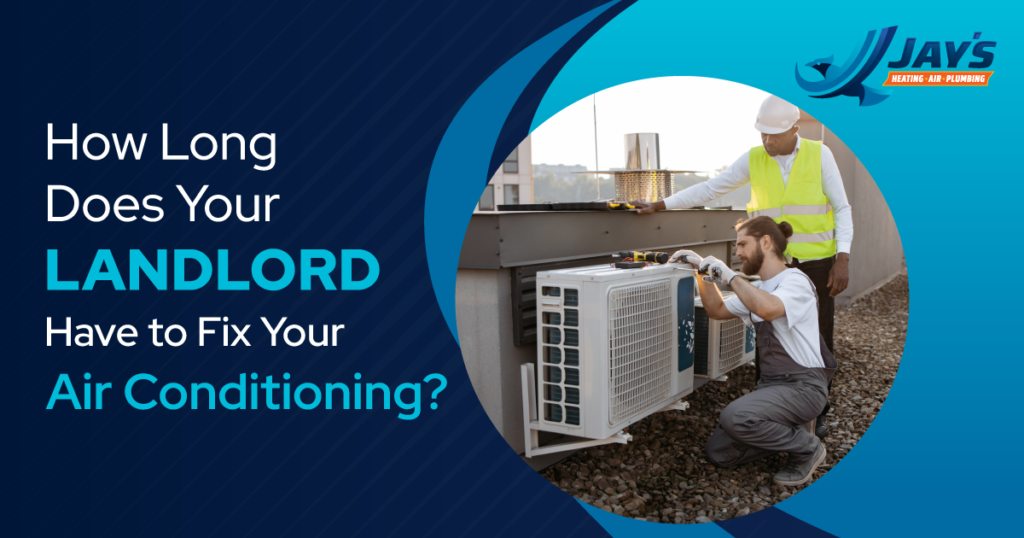
Summers in Winston-Salem and other North Carolina areas can be intense, and an AC system in a rental unit is a major perk during a 100-degree heat wave.
While a broken air conditioner can rapidly turn a rental home into an uncomfortable and even unsafe environment, landlord air conditioning repair responses are sometimes too slow. Understanding how long your landlord has to address AC repair requests and what you’re entitled to as a tenant helps you navigate repair requests, lease agreements, and potential legal action.
Understanding Landlord Responsibilities for AC Repairs
Obligations for landlords vary by state laws, local regulations, and lease agreement repair clauses. In North Carolina, landlords are obligated to keep rental units in reasonable and habitable condition. In addition to plumbing and electricity, those obligations include air conditioning. Many landlords handle air conditioning repairs promptly, but others may delay or ignore requests.
Is a landlord required to fix air conditioning?
North Carolina rental property maintenance laws mandate that landlords must maintain all facilities and appliances provided in the rental unit, which includes repairs. So while air conditioning isn’t an essential service or a required facility in rental units in most cases, landlords must maintain any provided AC systems. This includes making necessary repairs promptly upon receiving written notification from the tenant.
If AC is listed as an amenity in your lease and was functioning when you moved in, your landlord is responsible for the repairs unless your lease specifically states otherwise. If the unit never had AC and the lease doesn’t mention it, the landlord isn’t responsible for installing or repairing AC.
What laws govern air conditioning repairs in rentals?
North Carolina’s Residential Rental Agreement Act (NCRRA) requires landlords to keep rental units in fit and habitable conditions, which includes heat, water, and plumbing but not necessarily AC. Extreme heat, however, may make a rental unit uninhabitable under certain conditions and potentially obligate the landlord to provide and maintain AC. Local housing codes may also impose AC requirements.
How long does a landlord have to fix the AC?
North Carolina doesn’t provide a strict timeline, but landlords are expected to address repairs within a reasonable period. Individual lease agreements may also state how long landlords have to respond to repair requests — if so, this deadline agreement typically overrides state laws. Delays beyond a reasonable timeframe may give tenants grounds for legal action.
A reasonable timeline also depends on the severity or urgency of the problem. For emergency repairs, such as an AC breakdown that creates unsafe conditions, landlords should address the problem as soon as possible, usually within 24 to 72 hours. Non-emergency AC repairs for tenants may take up to several weeks depending on parts availability.
What to Do If Your Landlord Doesn’t Fix the AC
If your landlord delays repairs beyond a reasonable timeframe or refuses to repair the air conditioner, properly documenting and communicating the issue and following legal steps can help protect your tenant rights for AC repair.
How to properly request an AC repair
The first step is a formal repair request in writing, clearly outlining the issue and need for urgent repairs. A letter, email, or even text message usually qualify as a legally-binding record of communication between you and your landlord. If possible, provide photos of the AC problem to better support your request.
Can you withhold rent if your AC isn’t repaired?
Tenants generally can’t withhold rent unless their local jurisdiction or lease agreement states otherwise, and doing so may risk eviction. You can, however, pay for the problem yourself if your landlord doesn’t respond in a reasonable amount of time and request reimbursement. For emergency AC problems or building code violations, report it to local authorities to back up your claim and ensure landlord compliance.
Should a failed AC system make the rental uninhabitable, you may be able to break your lease without penalty. An unlivable rental may sometimes qualify as an eviction if it violates North Carolina rental laws or the lease agreement, in which case you’re not obligated to continue tenancy.
Can you take legal action against your landlord?
If you’re unable to resolve the dispute with your landlord, you can escalate the issue with legal action. In some cases, tenants take their cases to small claims court for repair reimbursement or to withhold future rent, also called rent abatement or recoupment, until you recover costs for the repairs and other damages.
Emergency AC Repairs: What Qualifies & What to Expect
AC breakdowns are often uncomfortable and inconvenient, but certain circumstances may be more urgent and warrant immediate attention from your landlord and an HVAC technician. In North Carolina, a broken AC is more likely to be an emergency if it immediately threatens the unit’s habitability and your household’s health and safety.
Prolonged exposure to high temperatures is the main danger of an air conditioner that produces little to no cool air. For example, heat waves in North Carolina may exceed 100 degrees, after which the risk of heat exhaustion and heat stroke increases significantly. This risk is even greater for elderly tenants, small children, or other vulnerable household members.
What if your AC breaks during extreme heat?
If your AC stops working during severe heat, notify your landlord immediately and document the conditions in writing and with photos or videos. Landlords may be responsible for providing interim cooling options while waiting for a technician, such as portable AC units or fans. Tenants may need to seek alternative housing if their home becomes uninhabitable, in which case they should request reimbursement from their landlord if they must stay in a hotel.
Otherwise, use these tips to stay safe during heat waves:
- Drink water regularly to stay hydrated.
- Limit heat exposure and remain indoors during the daytime.
- Check on individuals more susceptible to heat-related illness.
- Use fans and close window blinds to minimize heat accumulating indoors.
- Run a dehumidifier — lower humidity helps hot temperatures feel cooler.
- Avoid using heat-producing appliances.
- Look for signs of heat exhaustion, such as dizziness, rapid heartbeat, or nausea.
Know Your Rights & Stay Cool — Schedule AC Repair with Jay’s
Whether you’re dealing with extreme heat or ongoing maintenance delays, knowing your rights points you toward the right steps. If you need prompt and expert AC repair, Jay’s Heating, Air & Plumbing is here to help. Contact us today to schedule a service.
Frequently Asked Questions
Do you offer financing?
Jay’s provides several financing options so that homeowners can get the HVAC services they need without compromising their budget. We work with several financing partners and offer payment plan options to suit every customer.
Can a landlord install a cheaper or lower-quality AC unit as a replacement?
If the lease specifies a central AC system, the landlord can’t usually downgrade to a window unit without tenant consent. If the lease doesn’t specify details about the AC, the landlord may install a different unit that meets habitability standards.
What are the most common causes of AC failure?
Common reasons an AC system fails include clogged air filters, dirty evaporator coils, refrigerant leaks, and thermostat malfunctions. Regular maintenance helps prevent or minimize the risk of many of these problems.

